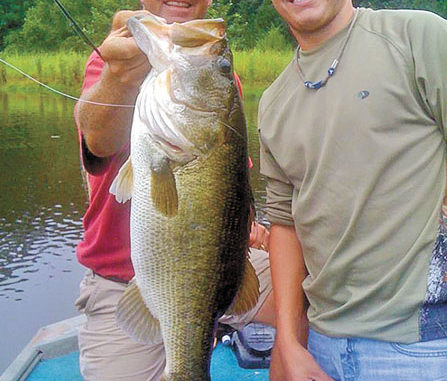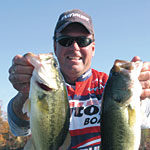
Everybody who fishes farm ponds thinks about fishing mostly in the spring, but I don’t want anybody to forget about how good the fishing can be in the fall. November is one of my favorite times to fish ponds, because the water has cooled off and the fish are aggressive, and that makes for some pretty good fishing.
A friend of mine who is an attorney in Abbeville — actually, he’s a cousin — has a nice pond that’s between two or three acres. I fished with him in the spring of 2009 and caught a 7½-pound fish, and I fished there recently and caught one that weighed 9½, so I’m excited about getting back there again. But anywhere you can drop a bait in a pond in November is good.
I really like pond-fishing in the fall because I get to use two of my favorite kinds of baits: topwaters and mop jigs. October is the best topwater month, but it doesn’t get too cold for them to still hit topwaters in November, and November is also a good jig month. Those are two baits I really throw a lot this time of year, and they’re two of my year-round favorites.
Ponds will vary somewhat, but not as much as bigger lakes. Most of the ponds you fish in the fall will have a dark, tannic look, so I like to fish a green-pumpkin Buckeye mop jig with a green-pumpkin Yamamato Flappin’Hog trailer with the claws dyed chartreuse. I like to swim that jig a lot, but it depends on the kind of cover I’m fishing in a particular pond.
Most of the ponds in South Carolina will have some kind of aquatic vegetation, and a lot of them will have a lot of vegetation. In the fall, it will be topped out because it’s been growing all summer, but it hasn’t gotten cold enough yet to kill it back.
Some of those ponds will have a lot of moss or lily pads, and it will difficult to fish on the bottom with a jig or a Texas-rigged worm. So many fishermen complain about grass and moss because it’s hard to fish around it, but it’s good fish habitat. If you own a pond, you’ve just got to keep it under control.
Anyway, when I visit a pond that’s got a ton of vegetation, especially if it’s topped out, I love to fish a topwater bait, especially a plastic scum frog or a rat. Snagproof makes a good one, and the Rojas frog is good. I just love to fish it, and a frog will really catch some big fish. When I won the FLW Championship on the Mississippi River out of Illinois, I won the biggest payday of my career, $250,000, fishing a plastic frog. But fishing for that kind of money or just at a pond is so much fun with a frog.
I used to fish a frog on 20-pound Trilene Big Game, but now I think braided lines are best to fish a frog with. You get better hook-sets, and you can get those fish out of the pads and the moss and the grass on braid. I fish frogs now on 30-pound Spiderwire Ultra Cast braid, on a 6½- to 7-foot medium to medium-heavy All-Star rod. You have no stretch with the line, and the rod’s heavy enough to get you a good hookset, but there’s enough tip that you can cast it a ways. Now, if you want to fish monofilament, I’d fish it on a flipping stick, because you need that backbone to get the hookset.
In a lot of ponds, you’ve got overhanging branches, so you need to make accurate casts, and you can make them with that 6½- or 7-foot rod a little easier than you can with a 7½-foot rod or a flipping stick.
I work a frog with a steady retrieve, but I’ll stop it and ease it into a little opening. The big thing, and it’s hard not to do it, is not to jerk it away from him. So many times those bass are coming up through that moss or those pads trying to eat that bait, and they don’t get it the first time. You have to be patient or calm enough not to jerk it away from him if he misses it. If a fish really blasts it but misses, you need to just let it sit for a few seconds, because a lot of times when they miss, they’ll circle back around looking for it, and you’ll get him the second time.
You hear a lot of people talk about fishing a pond like you’d fish a miniature version of a big lake, and if you’ve got a pond or a small lake that’s got threadfin shad, you can target areas where the shad are just like you would on a big reservoir. But if your pond doesn’t have shad, you need to find the bluegill. I look for them, especially in the fall, and I listen for them. If you sit real quiet, a lot of times you can hear them come up and slap against the bottom of pads or hear them eating bugs, popping the surface. When I hear that, it makes me real comfortable to fish in that area, because I know there are a lot of bluegill there and there will be a lot of bass, too.
Davy Hite, a 44-year-old native of Saluda who lives in Ninety Six, was BASS Angler of the Year in 1997 and 2002, and he has won the 1999 Bassmasters Classic and the 1998 FLW Tour Championship. He is sponsored by Advance Land & Timber, Triton boats, Evinrude outboards, All-Star rods, Pfleuger reels, Berkley Trilene, Yamamoto Baits, Owner hooks, Humminbird depthfinders and Solar Bat sunglasses.




Be the first to comment